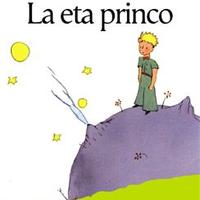XXIV
ESTIS la oka tago ekde mia paneo en la dezerto, kaj mi estis aŭskultinta la rakonton pri la vendisto, trinkante la lastan guton de mia akvoprovizo:
"Ho," mi diris al la eta princo, "viaj memoraĵoj ja estas beletaj, sed mi ankoraŭ ne riparis mian aviadilon, mi havas nenion plu por trinki, kaj ankaŭ mi estus feliĉa, se mi povus paŝi tute malrapide al fontano! " "Mia amiko la vulpo..." li diris al mi. "Mia etulo, ne temas plu pri la vulpo! " "Kial? " "Ĉar ni baldaŭ mortos pro soifo..." Li ne komprenis mian rezonadon kaj respondis al mi:
"Estus bone, ke oni havis amikon, eĉ se oni estas baldaŭ mortonta. Mi estas tre kontenta, ke mi havis amikon vulpo..."
"Li ne taksas la danĝeron," mi pensis. "Li neniam malsatas, nek iam soifas. Iom da suno sufiĉas al li..."
Sed li rigardis min kaj respondis al mia penso:
"Ankaŭ mi soifas... ni serĉu puton..."
Mi gestis lacece: "Estas sensence serĉi puton hazarde en la dezerta vastego." Tamen ni ekiris.
Post plurhora silenta marŝado, nokto falis kaj steloj eklumis. Mi vidis ilin kvazaŭ en sonĝo, iom febrante pro soifo. La vortoj de la eta princo dancis en mia memoro:
"Ĉu do vi ankaŭ soifas?" mi demandis lin. Sed li ne respondis al mia demando. Li simple diris:
"Akvo povas esti bona ankaŭ por la koro..."
Mi ne komprenis lian respondon, sed mi silentis... mi bone sciis, ke neniel utilus demandi lin.
Li estis laca. Li sidiĝis. Mi sidiĝis apud li. Kaj post silento li daŭrigis:
"La steloj estas belaj pro iu floro, kiun oni ne vidas..."
"Certe," mi respondis kaj sen paroli mi rigardis la faldojn de la sablo en la lunlumo.
"La dezerto estas bela..." li aldonis.
Kaj estis vere. Mi ĉiam amis dezertojn. Oni sidiĝas sur sablan ondon. Oni vidas nenion. Oni nenion aŭdas. Kaj tamen io radias en silento...
"Kio beligas dezerton," diris la eta princo, "estas, ke ĝi ie kaŝas puton..."
Mi miris subite kompreni tiun misteran radiadon de la sablo. Kiam mi estis knabeto, mi loĝis en antikva domo, kaj legendo rakontis, ke trezoro tie estis profunde enfosigita. Kompreneble, neniam iu sciis malkovri ĝin, eble eĉ nek serĉis ĝin. Sed ĝi ensorĉis la tutan domon. Mia domo kaŝis sekreton en la fundo de sia koro...
"Jes," mi diris al la eta princo, "ĉu temas pri domo ĉu pri steloj, ĉu pri dezerto, kio faras ilian belecon, estas nevidebla! " "Mi estas kontenta, ke vi samopinias kun mia vulpo," li diris. Ĉar la eta princo ekdormis, mi levis lin en miajn brakojn kaj denove ekiris. Mi estis emociata. Ŝajnis al mi, ke mi portas fragilan trezoron. Eĉ ŝajnas al mi ke estas nenio pli fragila sur la Tero. Mi rigardis en la lunlumo tiun palan frunton, tiujn fermitajn okulojn, tiujn harbuklojn, kiuj tremetis en vento, kaj mi diris al mi: "Tio, kion mi vidas, estas nur la ŝelo. Kio plej gravas, estas nevidebla..."
Ĉar liaj duone malfermitaj lipoj ridetis, mi ankaŭ diris al mi: "Kio tiom kortuŝas min pri la dormanta princeto, estas lia fideleco al la floro, estas bildo de rozo, kiu radias interne de li kiel flamo de lampo, eĉ kiam li dormas..." Kaj mi sentis, ke li estas eĉ pli fragila. Oni ja devas ŝirmi lampojn: ventblovo povas ilin estingi...
Kaj tiel iranta, tagiĝe mi malkovris la puton.

